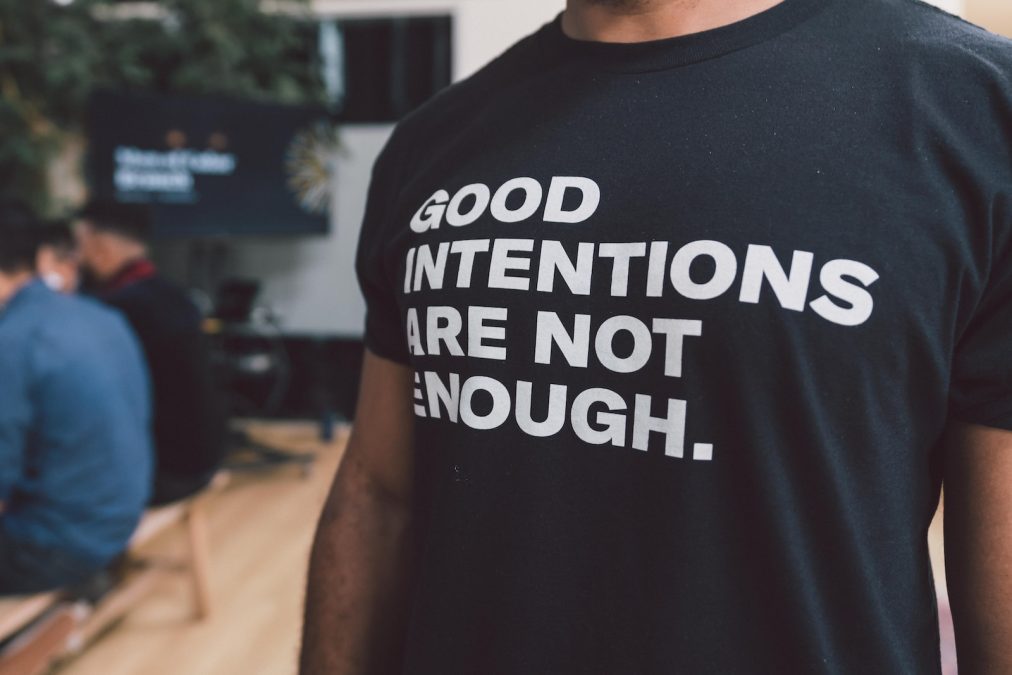
Speaking Truth To Power: A Reflection On The ‘Dignity for All’ Conference
July 5, 2023
Rachel Griffiths: The Art of Transformation
August 30, 2023Last month my daughter asked if she could go with friends to our local Pride event. My insides curdled; an involuntary physical response. Not because I am homophobic, quite the opposite! I am a staunch ally to marginalised communities, and champion LGBTQ+ issues as a core part of my work with The Ordinary Office. With this visceral reaction, my body was replaying the wariness with which I was raised to view homosexual behaviour, through my conservative Christian roots. I have agency to override this as an adult with independent theological study under my belt and a living relationship with God. So I let my daughter go to Pride with joy in my heart, knowing there is nothing embedded within her bodily experience to restrain her such as I have to contend with. Freely, she goes about her allyship as naturally as she breathes.
If we were still members of our former church family, my children would be receiving the same teaching as I did. That acting upon being gay is a sin. The only ‘proper’ way to respond to being gay is to be celibate. That homosexual relationships are only ever sinful because they are conducted outside of a marriage between a man and a woman. As an aside, Queer Theology has so much to teach us about such stances; do read Samuel 18:1-4 and consider the relationship between David and Jonathan carefully, for example. A covenant with exchange of items, two people becoming one spirit … sounds exactly like my marriage. Worth reflection, I suggest.
My children would be taught that David and Jonathan were just good friends. They would learn from important figures in their life that homosexuality is wrong. More in what was not said than what was said, perhaps. The silence around homosexuality, the inferred discrimination never explicitly stated for fear of repercussions. The awkward answers to naturally inquisitive questioning. Whereas at home and at school, they would be taught that LGBTQ+ people are equal and deserve equal rights. Like I did, they may have had to struggle to reconcile their inherent belief in the goodness of gay people they know, the joy in queer relationships they witness, with the church as a foundational element of their lives telling them that is wrong. Unnatural. Dirty. The cognitive dissonance, the splitting within their psyches as they try to navigate the two opposite things they understand to be true. The legacy of such struggles remain within the body for decades to come. Think I’m exaggerating? I commend ‘Bad Theology Kills’ by Kevin Garcia to you.
Abuse can be physical, and often is. But it can also be financial, emotional, spiritual, institutional and through neglect. When we teach a worldview which only fits heterosexual people, we neglect the holistic needs of the one in five among us with diverse gender expressions and sexualities. If such people grow up in traditional-leaning conservative churches, they are spiritually and emotionally abused as they are told untruths about their validity in the faith world, that God’s love is conditional on them acting against their very nature. It is no wonder the suicide rate amongst queer teens in families with faith is so high.
It is possible to believe in the covenant of marriage as a spiritual, life-long commitment between a man and a woman, and also to understand such binaries encompass the spectrum between the two and therefore marriage can be entered into by queer couples too. It is possible to believe sex is a sacred act which is best within marriage, but also to understand life is not perfect (or heaven would already be here on Earth!) and sometimes sex happens outside of marriage and that is also blessed. It is possible to believe in a set of values, understand others have different values equally ‘bible-based’ and therefore in grace we can use the power we have in the status-quo to enable our marginalised siblings in their pursuit of justice. Rainbows do not hold just two colours. Our world is made up of multi-layered beauty and there is space to celebrate all.
Safeguarding is not just about child abuse. It is about the microaggressions we live with if our presence in this world is not heteronormative. It is about what messages we embed in our cultures, perhaps without even realising. It is about understanding that while we are called to be ‘not of this world’ we are embodied within it, and perhaps that calling is not to be ‘better’ than those around us not in relationship with Christ, but to show we operate with grace, compassion and inclusivity beyond what this world would expect.
To safeguard my children, I had to remove them from church. That is a statement which should never be written, but I know I am not the only one. My children do not currently profess a faith, but I see God in them every single day. I know they belong to God, and I have faith their spirituality is under God’s tending. One of my most important jobs as a parent is to keep my children safe from abuse as they grow. How awful that institutional church should be synonymous with institutional abuse these days.
Rebecca is a writer and activist, with a focus on spiritual abuse and social justice. As co-leader of online community ‘The Ordinary Office’ Rebecca advocates for those disenfranchised by mainstream churches while providing pastoral support and resources for those who wish to continue exploring their faith. Rebecca’s short stories and reflections have been published both online and in print, with more works at various stages of development. She also edits works and produces audiobooks, supporting the wider community on the margins to share our unique perspectives. You can find Rebecca at www.deconstructingchurch.com, and at www.anordinaryoffice.co.uk.





3 Comments
Much of this oppressive behaviour comes from an underlying theology based on power. It’s a short step from ‘the Bible says’ and ‘God requires’ to ‘I say’ and ‘I require’. A servant theology which emphasises uncertainty and questioning what you are told us far healthier but sadly not as popular. Jesus seems to have asked far more questions than he provided answers. I am very suspicious of any church that is confident, authoritarian and narrow in its approach.
I am finding more and people (including a sermon in my own church) saying this sort of thing in just the last few weeks and months. Rebecca’s tale is heart-rending, and we MUST work to change the Church’s tune, or we are headed for disaster. I hope to see Modern Church focusing on this more and more strongly – and, if anyone reads this who is not a member, I urge you to join.
A brilliant analysis and one that accords with my experience exactly. I’ve passed this article to my Vicar in an inclusive church. We need to hear this.